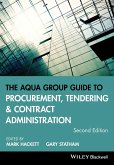This authoritative text provides a detailed insight into howconstruction companies manage their finances at both corporate andproject level. It will guide students and practitioners through thecomplexities of the financial reporting of construction projectswithin the constraints of accepted accounting practice. The book iswritten for non-accountants and from a contractor'sperspective and is equally relevant to subcontractors and maincontractors.
The authors examine the relationship between the external annualaccounts and the internal cost-value reconciliation process. CVR iscovered in depth and the authors consider issues such as interimpayments, subcontract accounts, contractual claims, final accounts,cash flow management and the reporting of the physical andfinancial progress of contracts.
A broad perspective of all the financial aspects of contractingis taken along with related legal issues and the authors explainhow things operate in the 'real world'. They describegood practice in financial control while at the same time beinghonest about some of the more questionable practices that can - anddo - happen. The approach taken is unique as the financialmanagement of construction projects is considered from theperspective of the contractor's quantity surveyor. The bookdeals with the real issues that surveyors have to address whenusing their judgment to report turnover, profitability, cash flow,and work in progress on projects and the financial problems facedby subcontractors are frankly and pragmatically explored.
The payment and notice requirements of the Construction Act areexplained in detail and relevant provisions of JCT2011, NEC3, ICC,DOM/1 and other standard contracts and subcontracts are alsocovered.
Financial Management in Construction Contracting addresses the wide variety of external factors that influence howconstruction companies operate, including government policy,banking covenants and the financial aspects of supply chainmanagement. Cost reporting systems are described and real-lifeexamples are used to illustrate cost reports, accrual systems andhow computerised systems can be employed to provide the QS withinformation that can be audited.
Examples drawn from practice demonstrate how work-in-progress(WIP) is reported in contracting. Cost value reconciliation reportsare featured and the book demonstrates how adjustments are made forovermeasure, undermeasure, subcontract liabilities and WIP as wellas explaining the processes that contractors use when analysingexternal valuations.
This is the ideal core text for final year degree andpost-graduate level modules on Quantity Surveying, CommercialManagement, Construction Management and Project Management coursesand will provide an invaluable source of reference for quantitysurveyors and others who may be engaged in the financial managementof construction projects.
The book's companion website at www.wiley.com/go/rossfinancialmanagement offersinvaluable resources for students and lecturers as well as forpractising construction managers:
end-of-chapter exercises + outline answers
PowerPoint slides for each chapter
ideas for discussion topics
links to useful websites
The authors examine the relationship between the external annualaccounts and the internal cost-value reconciliation process. CVR iscovered in depth and the authors consider issues such as interimpayments, subcontract accounts, contractual claims, final accounts,cash flow management and the reporting of the physical andfinancial progress of contracts.
A broad perspective of all the financial aspects of contractingis taken along with related legal issues and the authors explainhow things operate in the 'real world'. They describegood practice in financial control while at the same time beinghonest about some of the more questionable practices that can - anddo - happen. The approach taken is unique as the financialmanagement of construction projects is considered from theperspective of the contractor's quantity surveyor. The bookdeals with the real issues that surveyors have to address whenusing their judgment to report turnover, profitability, cash flow,and work in progress on projects and the financial problems facedby subcontractors are frankly and pragmatically explored.
The payment and notice requirements of the Construction Act areexplained in detail and relevant provisions of JCT2011, NEC3, ICC,DOM/1 and other standard contracts and subcontracts are alsocovered.
Financial Management in Construction Contracting addresses the wide variety of external factors that influence howconstruction companies operate, including government policy,banking covenants and the financial aspects of supply chainmanagement. Cost reporting systems are described and real-lifeexamples are used to illustrate cost reports, accrual systems andhow computerised systems can be employed to provide the QS withinformation that can be audited.
Examples drawn from practice demonstrate how work-in-progress(WIP) is reported in contracting. Cost value reconciliation reportsare featured and the book demonstrates how adjustments are made forovermeasure, undermeasure, subcontract liabilities and WIP as wellas explaining the processes that contractors use when analysingexternal valuations.
This is the ideal core text for final year degree andpost-graduate level modules on Quantity Surveying, CommercialManagement, Construction Management and Project Management coursesand will provide an invaluable source of reference for quantitysurveyors and others who may be engaged in the financial managementof construction projects.
The book's companion website at www.wiley.com/go/rossfinancialmanagement offersinvaluable resources for students and lecturers as well as forpractising construction managers:
end-of-chapter exercises + outline answers
PowerPoint slides for each chapter
ideas for discussion topics
links to useful websites
Highly recommended ***** Hi guys, thought I would share some thought provoking and agenda stimulating reading I have recently come across. The book is entitled "Financial Management in Constructing Contracting" by Andrew Ross & Peter Williams, but could easily have been called "The Constructor's Almanac" or "Wisdens Construction Guide". If you want the "inside line" on construction know how, this book covers it all.
From an understated promise to "explain how the financial position on construction contracts is reported" the book expands into every conceivable avenue the authors could explore in their quest to open up, explain, walk through and map, the processes that guide the industry and control the business operation of a construction company, from finance to bidding, managing risk to delivery, and every stop in between.
If you are a student, the early chapters on finance, accounting, contracts and procurement, will set out the basics of the industry in straightforward language, lots of good worked examples and clearly labelled diagrams. The later chapters address the subtleties of cash management, budget control, risk and opportunity management, progress monitoring, valuations and cost/value reconciliations, in far deeper detail and with contemporary work sheets to guide you through and explain the complexities of reporting cost and value in equal proportion.
The authors have extensive practical experience of the industry, both having risen from the shop floor to the lecture theatre, are suitably qualified to add insight to knowledge and have managed to capture in many ways the essence of the industry, its conflicts, collaborations, power plays and team working. And if you are of the social networking generation there is even a website on which to hone your new found skills. Fully interactive, it provides detailed worksheets and schedules to further explain the lessons contained in the printed version.
--David Monaghan
From an understated promise to "explain how the financial position on construction contracts is reported" the book expands into every conceivable avenue the authors could explore in their quest to open up, explain, walk through and map, the processes that guide the industry and control the business operation of a construction company, from finance to bidding, managing risk to delivery, and every stop in between.
If you are a student, the early chapters on finance, accounting, contracts and procurement, will set out the basics of the industry in straightforward language, lots of good worked examples and clearly labelled diagrams. The later chapters address the subtleties of cash management, budget control, risk and opportunity management, progress monitoring, valuations and cost/value reconciliations, in far deeper detail and with contemporary work sheets to guide you through and explain the complexities of reporting cost and value in equal proportion.
The authors have extensive practical experience of the industry, both having risen from the shop floor to the lecture theatre, are suitably qualified to add insight to knowledge and have managed to capture in many ways the essence of the industry, its conflicts, collaborations, power plays and team working. And if you are of the social networking generation there is even a website on which to hone your new found skills. Fully interactive, it provides detailed worksheets and schedules to further explain the lessons contained in the printed version.
--David Monaghan








